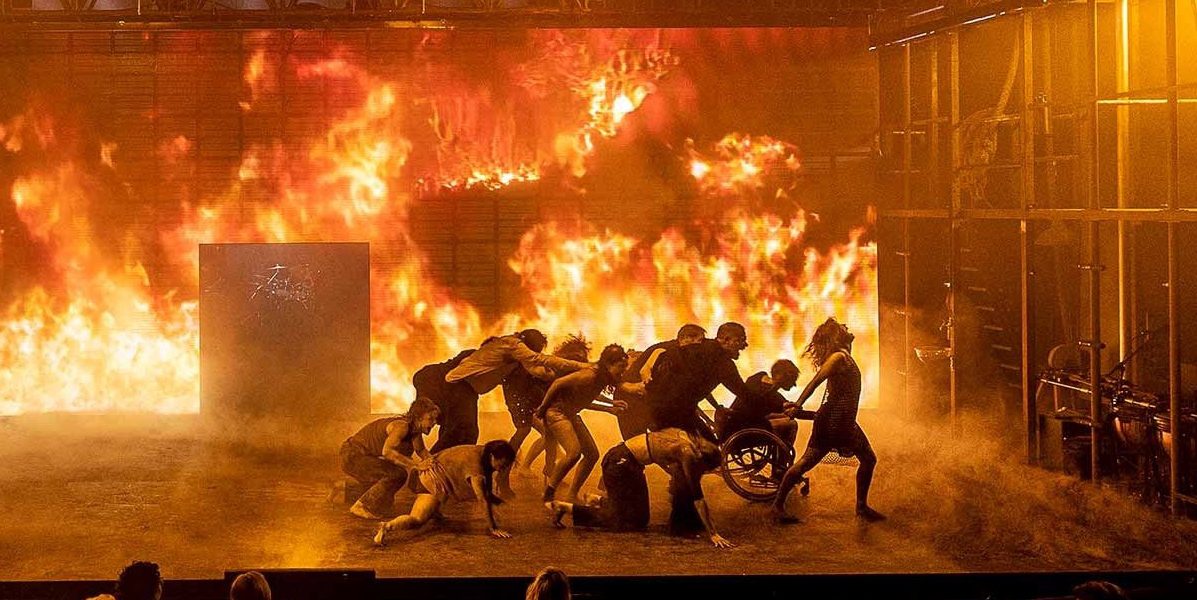Ivo van Hove is touring with his company Internationaal Theater Amsterdam, and comes to the Barbican for a brief residency. ‘The Age of Rage’ is similar in some respects to his recent take on Shakespeare’s Roman Plays: he is examining over a long period of time the dilemmas of politics and war filtered through the interactions of one family – the House of Atreus. His creative team take six plays of Euripides and one by Aeschylus to tell a story that is usually broken up into parts – we begin with the sacrifice of Iphigenia in Aulis as the Greek fleet is becalmed ahead of its departure for Troy, follow the traumas of the vanquished Trojan Queen Hecuba and her children, witness Clytemnestra’s revenge on Agamemnon, and then in the second half work through the consequences of that act for their children Orestes and Electra.
This is an all-too-apt moment in which to reflect on the contemporary resonances of this story, not least for the way that personal grievances and resentments morph uneasily into state policy and war. But the great strength of this evening is that the intersection of the political and the personal is examined from so many different angles with a sustained focus on the depressingly sustained power of revenge as a motive in human behaviour, particularly on the part of those who once marginalised and silenced emerge as radicalised fanatics.
The first half of the evening culminating in the murders at Argos is stronger than the second. This is partly attributable to the original source material where the vengeance of Orestes and Electra becalms the action of the later scenes in an angry rhetorical debate over the nature and boundaries of justice and the gods, whereas the quick interplay of war, conspiracy and family conflict gives the earlier scenes a continuous fluid dynamic.
However, this is also a function of the production and acting which fuse so well and memorably in the opening exposition. The set design by Jan Versweyveld makes full use of the height and depth of the Barbican stage with gantries and walkways akin to a rock concert that allow free movement between the human and divine realms. A backdrop allows for the projection of a broad array of colour schemes and helpful family trees to guide you through both mood and generational shifts. An atmospheric underscore by Eric Sleichim is omnipresent but not in a distracting way. Thunderous heavy metal music marks the key transitions with expert antiphonal timpani-playing by the combo Bl!ndman. This is a full, sometimes overwhelming sensory experience of gods and men pushed to their limits.
There is subtlety as well as power to be found here. True to the spirit of Greek drama which empowered the chorus in song and dance, the choreography by Wim Vandekeybus intercuts the dialogue with episodes of great expressive force, all the more so because the patterns of movement are designed for actors who are not professionals, and more emotionally powerful for the absence of sheer virtuosity or technical display. Inspired lighting effects and judicious selection of props ensure there are moments of mystery and delicacy as much as blood and gore.
This is an ensemble piece with a large cast and therefore it is somewhat invidious to emphasise certain performances over others. Nevertheless, there are some encounters which particularly resonate in the memory. In the opening play the anger and grief of Clymnestra at the sacrifice of her daughter come over with a shocking physicality in Chris Nietvelt’s portrayal before later curdling into lavish sadistic vengeance. As Iphigenia, Ilke Paddenburg transitions alarmingly from innocent ingénue to willing and committed victim of a political cause. As Queen Hecuba, Janni Goslinga embodies her degradation, defiance and resilience in the face of sustained abuse. Indeed, all the women in the cast realise and reflect the particular character of female victimhood in wartime, an aspect both very true to the original purposes of Euripides, and sadly reflective of historical and contemporary realities.
Among the male actors, Hans Kesting is exceptional in embodying Agamemnon’s shifty but anguished attempts to square family and political loyalties, and Achraf Koutet shows a fine versatility in a variety of roles, whether human and divine. Perhaps it was a mistake to add Aeschylus to Euripides, given their stylistic and dramatic differences; but this does not detract from a hugely skilful and powerful theatrical experience that demonstrates once again the craft and imagination of this director and company.

